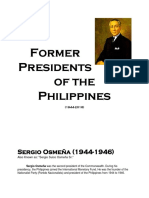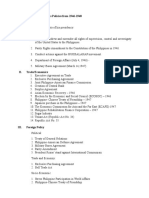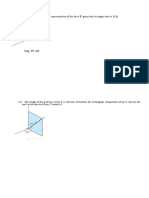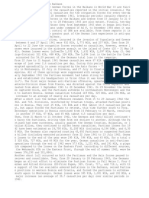Manuel Roxas Written Report
Uploaded by
israeljumboManuel Roxas Written Report
Uploaded by
israeljumboJamilah Dy Keisha Lao Lorraine Tiu Ayra Wang
Class Number 6 Class Number 13 Class Number 30 Class Number 35 WRITTEN REPORT ON MANUEL ROXAS:
Manuel Roxas (1892-1948) was the last president of the Commonwealth and the first president of the Republic of the Philippines. His administration demonstrated decisively that political sovereignty without economic independence encourages reaction, perpetuation of social injustices, and exploitation. He adopted a pro-American and anticommunist foreign policy owing to the massive economic and military assistance extended by the United States. The first priority of the Roxas administration was the solution of economic problems of the nation. In the field of agricultural development, various corporations like the National Coconut Corporation (NACOCO), National Abaca and Other Fibers Corporation (NAFCO) and National Tobacco Corporation (NTC) were formed to promote the welfare of farmers. During his short presidency, Roxas achieved the ratification of the Bell Trade Act (The Philippine Trade Agreement of 1946) which is an act passed by the U.S. Congress specifying the economic conditions governing the emergence of the Republic of the Philippines from U.S. rule; the act included controversial provisions that tied the Philippine economy to that of the United States. It provided for the continuance of free trade relations between the US and the Philippines for another eight years, from 19461954. This means that the U.S. citizens and corporations were granted equal access with Philippine citizens to Philippine minerals, forests and other natural resources, despite provisions in the Philippine constitution to the contrary which the act required to be amended. The agreement also provided for the imposition of graduated duty for the next 20 years from 1954-1974. Tariffs would be increased 5 percent annually until full amounts were reached in 1974. The agreement further provided for the unlimited entry of American goods into the Philippines. However, Philippines export of tobacco, cordage, sugar and coconut oil to the US were subjected to quotas. Other Philippine exports to the US would be subjected to absolute quotas after January 1, 1948 if these would be found competing with similar American products. Bell Trade Act also fixed the exchange rate to P2:$1. The rate could not be changed without the approval of the American government. Filipino nationalists denounced the Bell Trade Act. Even the reliably proAmerican Philippine President Sergio Osmena called it a "curtailment of Philippine sovereignty, virtual nullification of Philippine independence." The Tydings Rehabilitation Act of 1945 was a complement of the Bell Trade Act. It provided for the appropriation of $620 milllion for the rehabilitation and reconstruction of the Philippines and for those who suffered damages to their property during the war. However, no amount in excess of $500 will be released unless the U.S. and the Philippines come up with an agreement with regards to their trade relations. The
Rehabilitation Act was tied with the condition of amending the Philippine Constitution so as to grant parity rights to the Americans. The said Act would only take effect when the condition was met. The Treaty of General Relations Parties is for the purpose of the maintenance of close and harmonious relations between the two Governments (United States & Philippines). The treaty provided for the recognition of the independence of the Republic of the Philippines and the relinquishment of American sovereignty over the Philippine Islands. The Military Assistance Pact is another agreement entered to by the Philippines with the US. This agreement provided for the setting up of the Joint United States Military Advisory Group (JUSMAG) to advise the Philippine Constabulary, Army, Navy, Air Force and Intelligence Services. It further provided that the US would train the Armed Force and lend them weapons and equipment. Qualified officers would be sent to military schools in the US. The Mutual Defense Treaty was signed to ensure peace and security in the Pacific area. This treaty stipulated that an armed attack in the Pacific area against the Philippines or the US would be considered as endangering the peace and safety of both countries. It declared that it would act to meet the common danger in accordance to its Constitutional processes. The armed attack and measures taken either by the US or the Philippines should be reported to the United Nations Security Council. These measures should be stopped once the Security Council undertake measures to restore peace. The Philippine Rehabilitation Act (also known as the Tydings-McDuffie Act) approved was a United States federal law which provided for self-government of the Philippines and for Filipino independence (from the United States) after a period of ten years.. The TydingsMcDuffie Act provided for the drafting and guidelines of a Constitution for a 10-year "transitional period" which became the government of the Commonwealth of the Philippines before the granting of Philippine independence, during which the US would maintain military forces in the Philippines. Furthermore, during this period the American President was granted the power to call into military service all military forces of the Philippine government. The act permitted the maintenance of US naval bases, within this region, for two years after independence. The act reclassified all Filipinos that were living in the United States as aliens for the purposes of immigration to America. Filipinos were no longer allowed to work legally in the US, and a quota of 50 immigrants per year was established. Furthermore, the Act paved the way for the Filipino Repatriation Act of 1935. The Philippines became a member of the United Nations during the administration of Roxas. Carlos P. Romulo was elected as the 4th president of the UN General Assembly. He was the first Asian delegate to be elected as UN president. In 1952, Dr. Juan Salcedo was also elected president of the World Health Organization in Geneva, Switzerland.
During the early months of his administration, President Roxas tried to solve the problem regarding the Huks. He encouraged them to return to the fold of the law and cooperate with the government. However the Huk problem remained unsolved until his death. Roxas's policy toward the Huks alternated between gestures of negotiation and harsh suppression. His administration established an Agrarian Commission and passed a law giving tenants 70 percent of the harvest, although this was extremely difficult to enforce in the countryside. The Huks in turn demanded reinstatement of the Democratic Alliance members of Congress; disbandment of the military police, which in the 1945-48 period had been the equivalent of the old Philippine Constabulary; and a general amnesty. They also refused to give up their arms. In March 1948, Roxas declared the Huks an illegal and subversive organization and stepped up counterinsurgency activities. After President Roxass death, President Quirino took off where he left with regards to the unsolved Huk problem. He negotiated with Luis Taruc in Malacaang. The result of this negotiation was the granting of amnesty to the Huks.
REFERENCES: Bell Trade Act. (2010). In Encyclopdia Britannica. Retrieved February 08, 2010, from Encyclopdia Britannica Online: http://www.britannica.com/EBchecked/topic/59708/Bell-Trade-Act Bell Trade Act. (N.D.) In Wikipedia The Free Encyclopedia. Retrieved February 6, 2010 from Wikipidia the free Encyclopedia: http://en.wikipedia.org/wiki/Bell_Trade_Act What is the Tydings Rehabilitation Act? (April 2009).In Yahoo! Answers, from Yahoo! Answers: http://answers.yahoo.com/question/index? qid=20090704231521AAvbBCt Tydings-McDuffie Act. (N.D.) In Wikipedia The Free Encyclopedia. Retrieved February 9, 2010 from Wikipidia the free Encyclopedia: http://en.wikipedia.org/wiki/TydingsMcDuffie_Act Economic Relations with the United States (N.D.) In the U.S. Library of Congress. Retrieved February 9, 2010, from the U.S. Library of Congress: http://countrystudies.us/philippines/23.htm The Huk Rebellion. (N.D.) In the U.S. Library of Congress. Retrieved February 9, 2010, from the U.S. Library of Congress: http://countrystudies.us/philippines/25.htm
You might also like
- Warhammer Mark of Chaos - Concept Art Book100% (2)Warhammer Mark of Chaos - Concept Art Book97 pages
- Connecting Across Cultures - The Helper - S ToolkitNo ratings yetConnecting Across Cultures - The Helper - S Toolkit112 pages
- By The People: A History of The United StatesNo ratings yetBy The People: A History of The United States36 pages
- Ole Holsti - Making American Foreign Policy (2006) PDFNo ratings yetOle Holsti - Making American Foreign Policy (2006) PDF402 pages
- Postwar To Pre-Martial Law Roxas - Macapagal: Manuel Acuña RoxasNo ratings yetPostwar To Pre-Martial Law Roxas - Macapagal: Manuel Acuña Roxas13 pages
- Philippine Presidents: Manuel A. Roxas (1946-1948)No ratings yetPhilippine Presidents: Manuel A. Roxas (1946-1948)5 pages
- Independence and The Establishment of A New RepublicNo ratings yetIndependence and The Establishment of A New Republic6 pages
- A-HISTORICAL-REVIEW-OF-PHILIPPINE-FOREIGN-RELATIONSNo ratings yetA-HISTORICAL-REVIEW-OF-PHILIPPINE-FOREIGN-RELATIONS11 pages
- Codera - Presidents of The Third RepublicNo ratings yetCodera - Presidents of The Third Republic4 pages
- Today in Philippine History, April 30, 1946, The Philippine Rehabilitation Act of 1946 Was ApprovedNo ratings yetToday in Philippine History, April 30, 1946, The Philippine Rehabilitation Act of 1946 Was Approved18 pages
- PHILIPPINE FOREIGN POLICY UNDER SERGIO OSMEÑA PRESIDENCYNo ratings yetPHILIPPINE FOREIGN POLICY UNDER SERGIO OSMEÑA PRESIDENCY8 pages
- Ramon Magsaysay: Ramon Magsaysay, (Born Aug. 31, 1907, Iba, Phil.-Died March 17, 1957, NearNo ratings yetRamon Magsaysay: Ramon Magsaysay, (Born Aug. 31, 1907, Iba, Phil.-Died March 17, 1957, Near3 pages
- Post-War (Osmeña - Roxas) : By: Iris C. Quiñones Nico Junio Jermaine Kirt Martin Jill Medina Joey Vergeldedios HF14No ratings yetPost-War (Osmeña - Roxas) : By: Iris C. Quiñones Nico Junio Jermaine Kirt Martin Jill Medina Joey Vergeldedios HF1423 pages
- A Historical Review of Philippine Foreign RelationsNo ratings yetA Historical Review of Philippine Foreign Relations10 pages
- History of the Filipino People External Affairs (2)No ratings yetHistory of the Filipino People External Affairs (2)18 pages
- The Philippines After Second World War and The Philippine Presidents From 1946-1972No ratings yetThe Philippines After Second World War and The Philippine Presidents From 1946-197213 pages
- SOST203 REPORT-A HISTORICAL REVIEW OF PHILIPPINE FOREIGN RELATIONSNo ratings yetSOST203 REPORT-A HISTORICAL REVIEW OF PHILIPPINE FOREIGN RELATIONS61 pages
- Constitution Predecessor Successor Inauguration Capital Vice-President Chief Justice Senate President Speaker of The HouseNo ratings yetConstitution Predecessor Successor Inauguration Capital Vice-President Chief Justice Senate President Speaker of The House13 pages
- SSCI-102: Bataan Peninsula State UniversityNo ratings yetSSCI-102: Bataan Peninsula State University6 pages
- The Hukbalahap Movement and Other Resistance MovementsNo ratings yetThe Hukbalahap Movement and Other Resistance Movements20 pages
- Group6rphisfilipino Americanrelations 240113043715 4e27ed45No ratings yetGroup6rphisfilipino Americanrelations 240113043715 4e27ed4520 pages
- Philippine Presidents, Administration, Economy, Program, National Issues and Transnational Issues - Nikkie Evalla - Academia - EduNo ratings yetPhilippine Presidents, Administration, Economy, Program, National Issues and Transnational Issues - Nikkie Evalla - Academia - Edu17 pages
- President Manuel A. Roxas Policies From 1946-1948No ratings yetPresident Manuel A. Roxas Policies From 1946-194810 pages
- Massa Day Done: The Republican Constitution of Trinidad and Tobago: Origins and IssuesFrom EverandMassa Day Done: The Republican Constitution of Trinidad and Tobago: Origins and IssuesNo ratings yet
- Microprocessor: A Historical BackgroundNo ratings yetMicroprocessor: A Historical Background71 pages
- Overhead and Underground Distribution Lines: April Rose D. Herrera EE-5ANo ratings yetOverhead and Underground Distribution Lines: April Rose D. Herrera EE-5A40 pages
- Project Proposal On Environmental EngineeringNo ratings yetProject Proposal On Environmental Engineering5 pages
- Introduction To Optoelectronic Devices: Dr. Jing Bai Assistant ProfessorNo ratings yetIntroduction To Optoelectronic Devices: Dr. Jing Bai Assistant Professor27 pages
- Overhead and Underground Distribution Lines: April Rose D. Herrera EE-5ANo ratings yetOverhead and Underground Distribution Lines: April Rose D. Herrera EE-5A40 pages
- Forward Bloc and The Ina and Independence and Partition of India 2024No ratings yetForward Bloc and The Ina and Independence and Partition of India 20247 pages
- Richelson, J.T. (2011) - The U.S. Intelligence Community. Westview PressNo ratings yetRichelson, J.T. (2011) - The U.S. Intelligence Community. Westview Press30 pages
- 2024 Coimbatore Floor Plan - 04.06.2024 .No ratings yet2024 Coimbatore Floor Plan - 04.06.2024 .1 page
- The Grand Strategy of the Roman Empire From the First Century CE to the Third Luttwak - The ebook in PDF format is available for download100% (1)The Grand Strategy of the Roman Empire From the First Century CE to the Third Luttwak - The ebook in PDF format is available for download53 pages
- Download ebooks file End to the Bull Cut Through the Noise to Develop a Sustainable Trading Career An Gary Norden all chapters100% (4)Download ebooks file End to the Bull Cut Through the Noise to Develop a Sustainable Trading Career An Gary Norden all chapters24 pages
- USSBS Report 73, Campaigns of The Pacific War100% (2)USSBS Report 73, Campaigns of The Pacific War423 pages
- Before Auschwitz Irene Nemirovsky and the Cultural Landscape of Inter war France 1st Edition Angela Kershaw download pdf100% (2)Before Auschwitz Irene Nemirovsky and the Cultural Landscape of Inter war France 1st Edition Angela Kershaw download pdf81 pages
- Number Complete Name Grade/Section Adviser Surname First Name M.INo ratings yetNumber Complete Name Grade/Section Adviser Surname First Name M.I15 pages
- German Underwater Ordnance Contact and Moored Influence Mines - EMC II MineNo ratings yetGerman Underwater Ordnance Contact and Moored Influence Mines - EMC II Mine5 pages
- Villagran Et Al. 2021. A Proposal For Evaluating Psychosocial TraumaNo ratings yetVillagran Et Al. 2021. A Proposal For Evaluating Psychosocial Trauma8 pages
- Light in The Shadow of Jihad - Ravi Zacharias100% (3)Light in The Shadow of Jihad - Ravi Zacharias128 pages










































































































